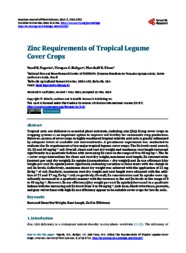Zinc requirements of tropical legume cover crops.
Zinc requirements of tropical legume cover crops.
Author(s): FAGERIA, N. K.; BALIGAR, V. C.; ELSON, M. K.
Summary: Tropical soils are deficient in essential plant nutrients, including zinc (Zn). Using cover crops in cropping systems is an important option to improve soil fertility for sustainable crop production. However, success of cover crops in highly weathered tropical infertile acid soils is greatly influenced by adequate levels of available soil micronutrients. A greenhouse experiment was conducted to evaluate the Zn requirements of ten major tropical legume cover crops. The Zn levels used were 0, 10, 20 and 40 mg·kg-1 soil. Overall, shoot and root dry weight and maximum root length increased significantly in a quadratic fashion with increasing Zn rates in the range of 0 to 40 mg·kg-1. The Zn × cover crops interactions for shoot and root dry weight, maximum root length, Zn concentration (content per unit dry weight), Zn uptake (concentration × dry weight) and Zn use efficiency (dry weight per unit Zn uptake) were significant, indicating variation in these traits with the change in soil Zn levels. Collectively, maximum shoot dry weight was achieved with the application of 22 mg Zn·kg-1 of soil. Similarly, maximum root dry weight and root length were obtained with the addition of 22 and 17 mg Zn·kg-1 soil, respectively. Overall, Zn concentration and Zn uptake were significantly increased in a quadratic manner with the increase in the soil Zn levels in the range of 0 to 40 mg·kg-1. However, Zn use efficiency (dry weight per unit Zn uptake) decreased in a quadratic fashion with the increasing soil Zn levels from 0 to 40 mg·kg-1. Jack bean, black velvet bean, pueraria, and gray velvet bean with high Zn use efficiency appear to be suitable cover crops for low Zn soils.
Publication year: 2014
Types of publication: Journal article
Unit: Embrapa Rice & Beans
Keywords: Planta de cobertura, Raiz, Zinco
Observation
Some of Embrapa's publications are published as ePub files. To read them, use or download one of the following free software options to your computer or mobile device. Android: Google Play Books; IOS: iBooks; Windows and Linux: Calibre.
Access other publications
Access the Agricultural Research Database (BDPA) to consult Embrapa's full library collection and records.
Visit Embrapa Bookstore to purchase books and other publications sold by Embrapa.

